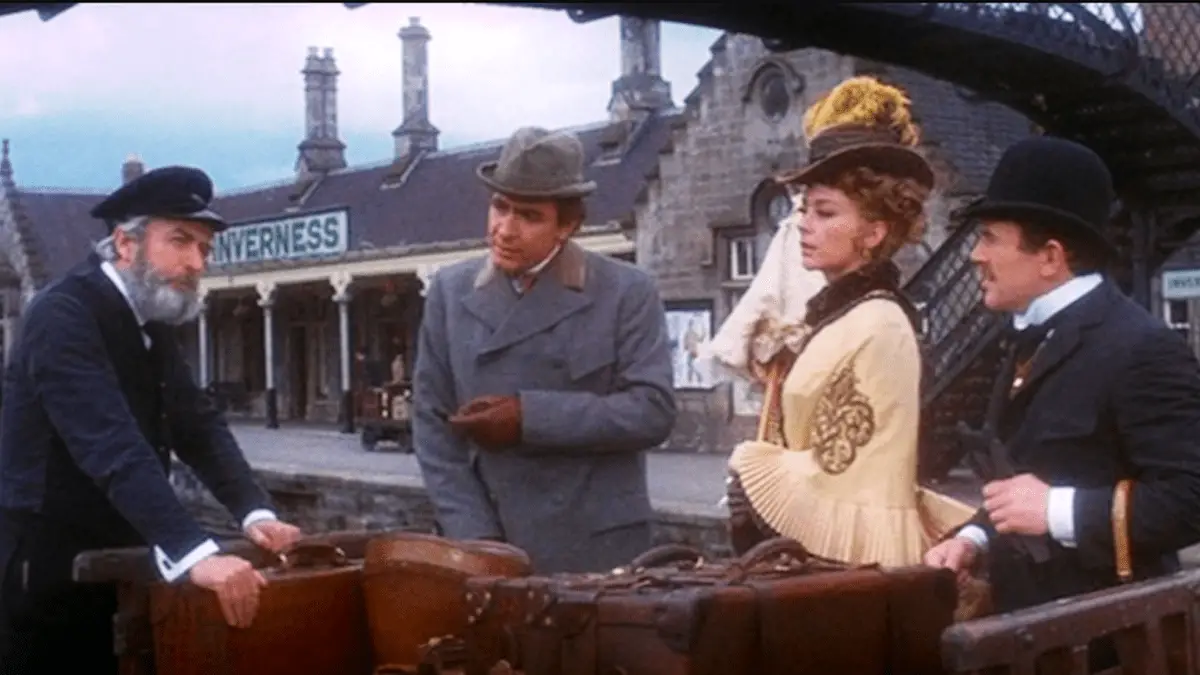"The game is afoot!"
It is the summer of 1887 and Sherlock Holmes is lamenting the lack of any decent crime that might stimulate his brilliant mind. "There are no great crimes anymore, Watson! The criminal class has lost all enterprise and originality." In his morning mail, he receives a telegram asking for his help in locating six missing midgets from a circus, which he promptly dismisses. It is not until a cabby brings a bedraggled-looking woman to the doorstep of 221B Baker Street that Sherlock turns away from his seven-per-cent solution of cocaine to take interest in a case that will become one of his rare failures and ultimately be written down in Dr. Watson's private memoirs of the great detective.
Gabrielle Valladon is the mysterious woman who arrives on his doorstep one evening. She was rescued from the river after someone attempted to drown her and has a minor lapse of memory. Watson suggests she stay the night and by morning she is recovered and accounts to Holmes her predicament. It seems that her husband, a mining engineer by the name of Emile, has disappeared. For the past year, she has been writing to and receiving letters from an address that she has just discovered is an empty building.
This intrigues the private detective enough to warrant a visit to the building. Together with Mrs. Valladon and his faithful companion Dr. Watson, Holmes discovers some baffling clues at the site...namely, an old woman in a wheelchair who collects the mail and a cage of canaries. These insignificant but intriguing findings only hint at the adventure ahead for the trio, a case that will lead them into the heart of Scotland and to an encounter with Queen Victoria herself!
The Private Life of Sherlock Holmes is a marvelous film by director Billy Wilder. It captures all of the excitement of Arthur Conan Doyle's original stories and yet it is an entirely new adventure penned by Wilder himself and screenwriter A.L. Diamond, who also produced the film. The story incorporates all of the elements one would hope to find in a Sherlock Holmes film adaptation, plus some added surprises...such as midgets and the Loch Ness monster.
Our titular hero is played by Robert Stephens (The Prime of Miss Jean Brodie) who does an excellent job of portraying the arrogant yet highly appealing detective. Stephens played an amateur detective in an episode of The Rivals of Sherlock Holmes one year later, but never returned to don the deerstalker again which is a shame since he plays Holmes so well.
Colin Blakely costars as the loyal Dr. Watson. His characterization of Watson differs from any of the actors who played Watson before (Nigel Bruce, Howard Marion-Crawford, Nigel Stock, etc.). Blakely's Watson is impetuous and slightly comical and he often gets frustrated that Sherlock does not confide in him as much as he would like. The relationship between Holmes and Watson in this film reminds me of Danger Mouse and his faithful friend Penfold in the Danger Mouse series. Poor Penfold was often left in the dark about the cases they were working on, too.
The lovely but mysterious Mrs. Valladon is played by French actress Genevieve Page. Holmes is quoted by Watson as having said that "women are never to be entirely trusted, not the best of them", an observation based on previous experiences. Yet he trusts Mrs. Valladon - and once again regrets it.
The Private Life of Sherlock Holmes also includes the characters of Mrs. Hudson (played by the inimitable character actress Irene Handl) and Sherlock's brother Mycroft, played by Christopher Lee. Years later, Lee himself would star as Sherlock in a series of television films.
Billy Wilder had a tendency to stretch out his productions till they were overly long and The Private Life of Sherlock Holmes is no exception. The film features a sequence at the Royal Ballet in London where Holmes meets a Russian prima-donna who wants to marry him so that she can have "brilliant babies". It probably was meant to amuse and address Watson's feelings towards Holmes and their living arrangement, but the entire sequence was unnecessary and bore no relation to the mystery that Holmes eventually embarks on. The scene could have been cut entirely and replaced with a bit of dialogue referring to the incident instead.
However, aside from this minor flaw, the film is excellent in so many ways. Miklos Rozsa composed a beautiful score for the picture which was based on a 1953 concerto of his that Billy Wilder favored - Violin Concerto Opus. 24. Tony Iglis' art direction is simply stunning, the costumes (by Julie Harris) are wonderful, and the cinematography by Christopher Challis (The Small Back Room, Arabesque) is lovely, as is the color tone of the entire film, which was shot in Cinemascope. Billy Wilder rarely made films in color so this is a treat for him and for the audience and one that he should have indulged in decades earlier.





I'm a big fan of this offbeat film. Billy Wilder wanted to explore the human side of Holmes, and Robert Stephens does a wonderful job showing a Sherlock who is lonely and sensitive. The music score truly is fantastic, and there is the added bonus of Christopher Lee as Holmes' elitist brother Mycroft.
ReplyDelete